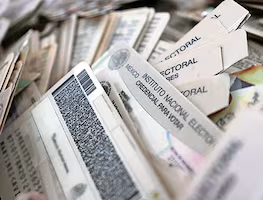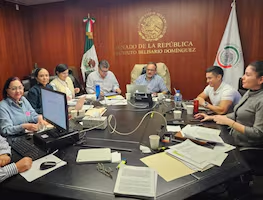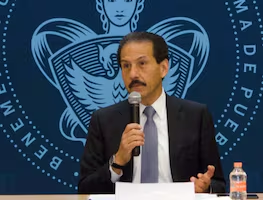Más Información

“Somos México” busca su registro como partido político; Frente Cívico Nacional y México Unido lo presentan ante el INE

Tramita o renueva tu credencial del INE para participar en el elección judicial; esta es la fecha límite

Primeros deportados detenidos en redadas de Trump llegan a Tijuana; “nos agarraron trabajando”, cuentan

Inician entrevistas vía Zoom para aspirantes a elección judicial; piden estar atentos al correo electrónico

Confirma tribunal que exrector de la BUAP está libre de cargos; carecen de elementos probatorios, aseguran

Frente frío 24 y masa ártica golpean México con lluvias y ambiente gélido; evento de “Norte” afecta Tamaulipas y Veracruz
The country has been focusing on the war against drug trafficking for the last decade, which is understandable given the magnitude of the problem, although it would be timely to ask if authorities fight the rest of the crimes with the same force. Everything indicates this isn't the case.
Today, EL UNIVERSAL reveals a dramatic reduction in the fight against piracy , especially against counterfeit books . From 2007 to 2017 , the PGR and the Federal Polic e seized 672,207 counterfeit books in the country; in 2007 alone, 393,000 counterfeit books were seized, and this number hasn't been repeated. Last year, only 10,368 books were seized by the PGR and none was seized by the Federal Police.
The main parties affected are two: the industry that employs thousands of workers and the reader , who has to pay higher prices as a result of the proliferation of counterfeit books .
The publishing industry calculates that the economic losses amount to MXN $2,500 million , a fourth of the book sales in 2017. The industry has less and less resources to produce books , which makes them more expensive. If they only print 500 books , instead of 2,000 books, because of the decrease in sales attributed to piracy , the costs increase.
The existence of counterfeit products and the lack of operations to eradicate them are the key elements that trigger a series of negative repercussions . The counterfeit products attract consumers but affect another industry , whose sales are affected. In order to revert the situation, the manufacturer starts producing less and increases the price of its products but the number of buyers diminishes and the loss of revenue worsens. The reduction in staff end closing companies are the last options.
As the representatives of the Mexican publishing industry say, it's not only important to punish piracy, but also help the buyers to become aware of the damages caused by buying counterfeit books . Every publishing house has to allocate resources to pay the author , plan the design of a book , proofread the edition, buy paper , print the book, schedule its distribution , among many other processes, which doesn't compare to the copies sold in the streets.
The lack of resources shouldn't be an excuse to justify the purchase of a counterfeit product . There are several ways to acquire books at a lower price, including digital versions , or through initiatives like the one recently announced by the Fondo de Cultura Económica , the state-owned publishing house , that proposed selling books for MXN $10.
It's necessary to fight against piracy again, to support a weak industry , which reports crushing numbers : in Mexico , 4 out of 10 books are counterfeit versions .
gm





